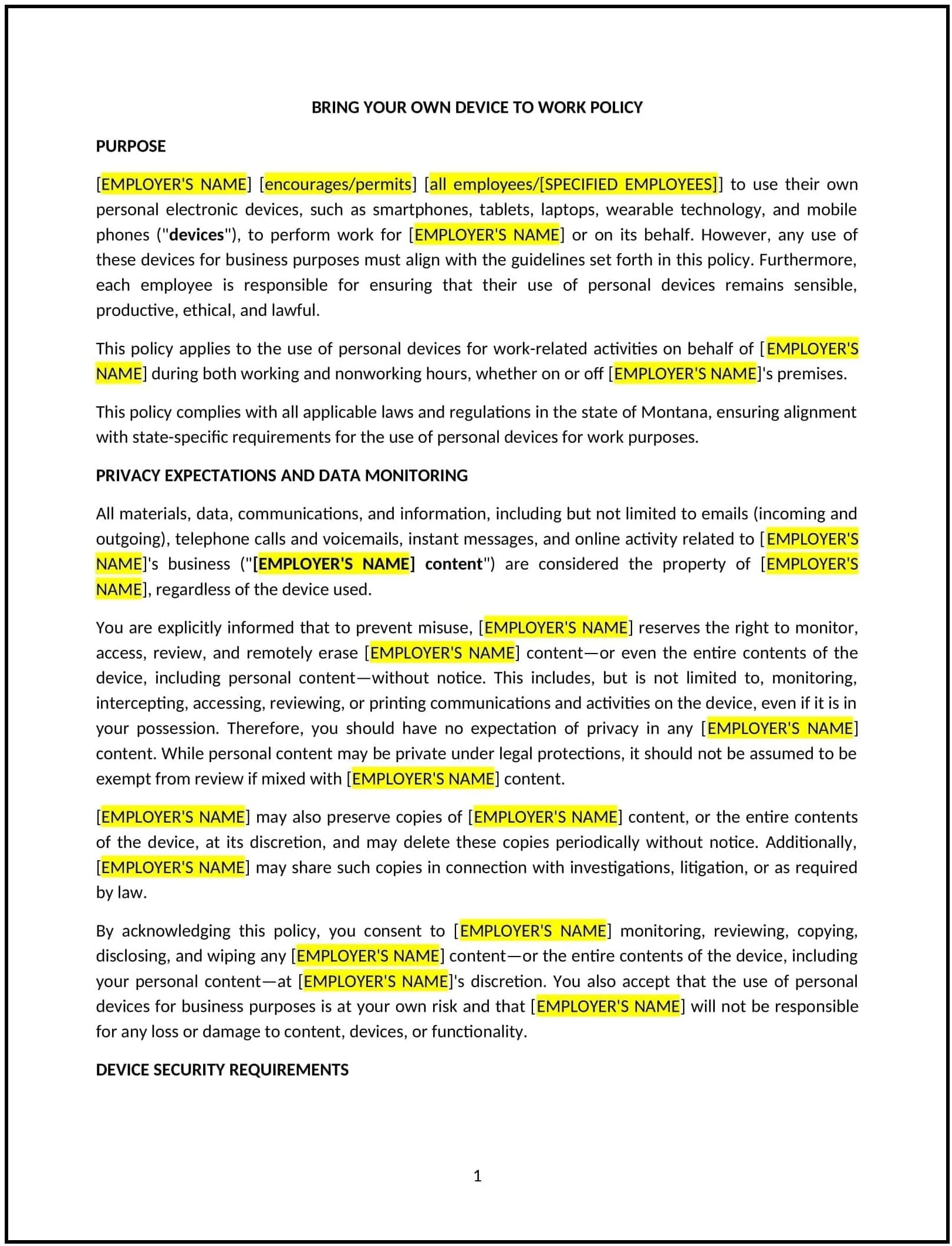Bring your own device to work policy (Montana): Free template
Got contracts to review? While you're here for policies, let Cobrief make contract review effortless—start your free review now.

Customize this template for free
Bring your own device to work policy (Montana)
A bring your own device (BYOD) policy helps Montana businesses establish guidelines for employees who use personal devices such as smartphones, laptops, and tablets for work purposes. This policy outlines security requirements, acceptable use, and data protection measures to minimize risks while allowing employees flexibility in how they work.
By implementing this policy, businesses can balance the benefits of employee-owned devices with the need for cybersecurity, data privacy, and operational control.
How to use this bring your own device to work policy (Montana)
- Define eligible devices and usage: Businesses should specify which personal devices may be used for work purposes and outline any restrictions on device types or brands. The policy should also clarify acceptable work-related activities, such as accessing emails, using collaboration tools, and handling confidential data.
- Establish security requirements: Businesses should require employees to implement security measures such as password protection, encryption, and automatic device locking to reduce the risk of data breaches.
- Outline data access and protection: Businesses should define how company data should be accessed, stored, and transmitted on personal devices. Using secure networks, VPNs, and company-approved applications should be encouraged.
- Set expectations for software and applications: Employees should only install approved work-related applications on personal devices and avoid using unauthorized software that may pose security risks.
- Address lost or stolen devices: Businesses should require employees to report lost or stolen devices immediately to IT or management to protect sensitive business information. Remote wipe capabilities may be necessary for company-owned data.
- Define reimbursement and cost responsibilities: Businesses should clarify whether employees will receive reimbursement for data plans, software, or maintenance costs associated with using personal devices for work.
- Review and update regularly: Businesses should periodically assess the BYOD policy to address evolving cybersecurity threats, legal considerations, and technological advancements.
Benefits of using this bring your own device to work policy (Montana)
This policy provides several key benefits for Montana businesses:
- Increases workplace flexibility: Employees can work from various locations while using familiar devices.
- Reduces hardware costs: Businesses save money by allowing employees to use their own devices instead of purchasing company equipment.
- Enhances productivity: Employees who use personal devices may work more efficiently and seamlessly across work and personal tasks.
- Improves data security: Clear policies help businesses implement safeguards that protect sensitive company information on personal devices.
- Establishes clear accountability: Employees understand their responsibilities for securing company data and maintaining proper device usage.
- Supports remote and hybrid work: Employees can stay connected and collaborate effectively, even outside of the office.
Tips for using this bring your own device to work policy (Montana)
- Communicate security expectations: Businesses should ensure employees understand the importance of protecting company data on personal devices.
- Implement mobile device management (MDM): Businesses should consider MDM solutions to monitor and secure employee devices that access company systems.
- Require regular software updates: Employees should keep their personal devices updated with the latest security patches and antivirus software.
- Limit access to sensitive data: Businesses should restrict access to confidential information based on an employee’s role and security clearance.
- Provide IT support guidelines: Businesses should outline the level of technical support available for employees using personal devices.
- Monitor compliance: Businesses should regularly review BYOD usage and enforce security policies to minimize risks.